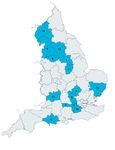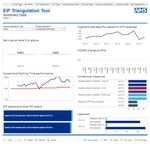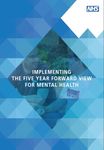Early Intervention in Psychosis Network 13 February 2020 - Yorkshire and the Humber
←
→
Page content transcription
If your browser does not render page correctly, please read the page content below
Yorkshire and the Humber
Mental Health Network
Early Intervention in Psychosis Network
13 February 2020
• Stephen McGowan, EIP Clinical Lead for Y&H CN and NHSE (North) (Chair)
• Dr Steve Wright, Consultant Psychiatrist, TEWV (Co-Chair)
• Sarah Boul, Quality Improvement Manager sarah.boul@nhs.net
• Twitter: @YHSCN_MHDN #yhmentalhealth
• February 2020
www.england.nhs.ukYorkshire and the Humber
Early Intervention in Psychosis Network
Welcome and Housekeeping
Sarah Boul, Quality Improvement Manager,
Yorkshire and the Humber Clinical Networks
www.england.nhs.ukSlido:
At today’s meeting we are going to use Slido to
allow people to ask questions and take part in
polls.
• The WIFI code for the venue is:
• Then open: www.slido.com
• Enter code: #F485
Now let’s give it a go!!Yorkshire and the Humber
Early Intervention in Psychosis Network
University of Hull 2020 CBTp program,
supervision workshops and masterclasses
Gavin Lawton, Program Director CBT SMI, University of Hull
www.england.nhs.ukOverall course aims: • In increase access to CBT/ SMI training. • To give people an opportunity to be taught CBT to diploma level. • To maintain essential quality ingredients of IAPT high intensity training (reference to key evidence based protocols, evaluation of competence using recognised criteria) • To progress to implementation of CBT with secondary care clients and cover presentations included SMI IAPT competencies. • To establish the basics first and then specialise
Course Overview • For the PG Dip: Four taught modules, part – time over two years • Module 1: Basic CBT theories and Skills (30 credits) • Module 2: CBT for Common Disorders and Processes in SMI (30 credits) • Module 3: Psychosis and Bipolar Disorder (20 credits) • Module 4: Complex Disorders including Personality Disorders (20 credits) • In addition, two supervision modules (each 10 credits). Clinical work and supervision to be undertaken in service. • Six modules in total to complete the PG Diploma • Also: the taught modules can be taken individually
Plus… • Portfolio of work, to be recorded on PebblePad. • This covers clinical work from both supervised practice modules. • The Portfolio will support the BABCP Accreditation process.
The Course structure means that • Trainees can leave at the end of year one with a Post Graduate Certificate in CBT. • People with existing CBT Cert, CBT Dip or psychology qualification can join in year 2 (Top Up) and receive a Post Graduate Certificate. • Or can join to do either the CBTp or CBT for complex cases as a stand-alone 20 credit module.
Current Developments • Tender for Post Graduate Diploma in CBT-SMHP ongoing for September 2020 start. • New National Curriculum for CBT-SMHP • Year 1 3 x 20 credit modules Foundations of CBT CBT for Anxiety Disorders CBT for depression • Year 2 • 1 x generic complex disorder module (20 credits) • A choice of 3 pathways totalling 40 credits (CBT Psychosis and Bipolar, CBT Personality Disorders, CBT Eating Disorders)
• ‘Top Up’ access would be to one of the 3 pathways and access would be from September 2021. • The Tender also requires us to deliver CBT supervision training.
CBTp Masterclasses 2020 • Dr Lizzie Newton & Liz I’Anson, ‘Keeping Mood on Track – Cognitive Behavioural Group Psychoeducation and Individual Staying Well work with people with a diagnosis of Bipolar Disorder’. 30th March. • Dr Charlie Heriot-Maitland, ‘ Compassion Focussed Therapy and Psychosis’. 30th April. • Dr Katherine Berry, ‘Attachment and Psychosis’. 18th May. • Dr Pamela Jacobsen, ‘Mindfluness and Psychosis’ (date TBC). • Dr Christopher Taylor, ‘Imagery Techniques and Psychosis’ (TBC) https://shop.hull.ac.uk/conferences-and-events
Yorkshire and the Humber
Early Intervention in Psychosis Network
Integrated care systems, the new
community mental health framework
and the prevention concordat: where
EIP fits in
Dr Steve Wright, Co-Chair, Consultant Psychiatrist, TEWV & Clinical
Advisor, Y&H Clinical Network
www.england.nhs.ukA Brief Strategic Overview of Community Mental Health Steve Wright Yorkshire & Humber EIP Clinical Network
A Brief Strategic Overview of
Community Mental Health
• NHSE
• 44 STPs (3 in Yorkshire & Humber)
• S is for Sustainability &
• T is for Transformation
• P is for………….
• Plan
• Programme
• PartnershipFrom the top to the bottom of the LTP • Integrated Care Systems (ICS) Wave 1 completed, 2nd Wave from April 2020 then (final?) wave September 2020 • Integrated Care Partnerships (ICP) • Place (~250k) • Primary Care Networks (PCNs) (30-50k) • Ward & Street Level Populations
The NHS Long Term Plan sets out that “by April 2021,
Integrated Care Systems will cover the whole country”
Integrated care systems (ICSs) bring together local organisations to
redesign care and improve population health, building partnership with
local government and community partners, developing shared leadership
and action and managing collective resources
ICSs are a way of creating shared local responsibility to:
• Improve quality of care, access to care and health outcomes,
• Reduce inequalities and address the population health challenges in a
system
• Address wider determinants of health and wellbeing and provide
better, more independent lives for people with complex needs
• Create the capacity to implement system-wide changes
NHS England ICSs, 2019
1. South Yorkshire and Bassetlaw 13. Suffolk and North East Essex
2. Frimley Health and Care 14. North Cumbria
3. Dorset
4. Bedfordshire
5. Nottinghamshire
6. Lancashire and South Cumbria
7. Berkshire West
8. Buckinghamshire
9. Greater Manchester (devolution deal)
10. Surrey Heartlands (devolution deal)
11. Gloucestershire
12. West Yorkshire and Harrogate… and are expected to implement new service models to support more joined-up, proactive and person-centred care
0-25 services
• Year- by- year milestones for delivery (realistic and achievable)
• e.g. “19/20: review data and needs analysis, 20/21: develop commissioning plan,
21/22, phased approach to implementing 18-25 offer, 23/24: comprehensive offer
in place”
• Whole pathway focus commitment to support both ends of the age spectrum
• Needs analysis identifies local need
• Join up across adult and CYP MH services “we will plan and deliver training to
further develop competencies of IAPT and CMHT practitioners to support young
adults”
• Reflects the multi agency nature of the ask - support for CYP 0-25 requires
partnership working across health, social care and education not just across
CYPMH and AMH.The “Prevention Concordat”
• Prevention involves reducing the incidence and prevalence of
mental health problems and suicide.
• Primary prevention aims to prevent the onset of mental health problems by
addressing the wider determinants of illness and using ‘upstream’ approaches that
target the majority of the population.
• Secondary prevention involves the early identification of signs of mental health
problems or suicide risk and early intervention to prevent their progression or the
development of other health complications.
• Tertiary prevention involves working with people with established mental health
problems to promote recovery and prevent (or reduce the risk of) recurrence.
Mental health promotion is part of primary prevention but
also important for those experiencing and at risk of
developing, mental health problems.
Prevention Concordat for Better Mental
21
Health ProgrammeA public mental health approach
•World Health Organization and SDG
methodology for public mental health
which has been adopted by Public Health
England
•Everyone, irrespective of
where they live, has the Mental health
promotion
opportunity to achieve good
mental health and wellbeing
- especially communities
Reducing
facing the greatest barriers Mental illness premature
prevention and mortality for those
and those people who have suicide living with or
prevention
to overcome the most recovering from
mental illness
disadvantages.
•This includes those living with and recovering from
mental illness
22 A Public Mental Health ApproachSign up – Who is it aimed at? Partnerships: Sustainability and Transformation Partnership, Health and wellbeing Boards, Community Safety partnerships, Voluntary sector partnerships Organisations: Local authority, Clinical Commissioning Groups, NHS Hospital Trust, Voluntary organisation Communities: local community groups, faith groups, Big Locals National organisations: Professional membership bodies, charities, government agencies
Prevention Concordat for
Better Mental Health: Local
Adoption and Signatories
August 2019
Prevention Concordat for Better Mental
Health – Local areas signed up 2425
The Community Mental Health
Framework for Adults and Older Adults
A radical change in the approach towards the delivery of community mental
health care (NHS, social care, VCS, public health, communities):
An integrated model of community based mental health care for adults
(including those over 65), from less complex to complex mental health
needs
Primary care being enabled to provide a broader range of services in the
community that integrate primary, community, social and acute care
services, and bring together physical and mental health
Organised at the local community level for a population of around 30,000 -
50, 000 people (approximately 5 to 12 practices)
Linked closely with wider community services (populations typically of
150, 000 to 200, 000) that focus on more complex needs where services
are provided by specialist multidisciplinary mental health teams
Local needs, local geography and specialist services arrangements may
contribute to variation in population size
19/02/202026
The new model
Development of an integrated core community mental health
network which brings together the extensive mental health support
and treatment:
1) currently provided in primary care for people with less complex and
complex needs; and
2) provided by current secondary care community mental health teams
This model of care replaces the current models for delivery of care
(where care is delivered separately from primary care or secondary
care) through integrating mental health, physical health and social
care
Teams will be multidisciplinary, with strong links with crisis teams
(which may be provided at a wider community level) and other
services such as inpatient care, residential and liaison mental health
services in emergency departments
19/02/202027
A core community mental health
network
The central functions of a core community mental health network will be to
effectively treat, care for and support people with the full range of mental health
problems in a community setting. This will involve:
Assessment and advice
Assessment and brief interventions and other interventions
Community support
Care management
Specific psychological, pharmacological and social interventions
The specific make-up of each network or team may be subject to local
determination, based on the particular needs of a geographic area or population
Networks will have common pathways for specific needs or problems, agreed
protocols for the delivery of care, shared protocols for the management of
specific problems, and reduction in multiple points of access
19/02/202028
Principles for a community mental
health framework
The organising principles of the community mental health framework are
that they should:
Organise care around their communities
Dissolve barriers between primary and secondary care, and between health care,
social care and VCS services
Step up and step down care for people with increasing complexity and more specialist
needs
Know their communities, including to, as a result, understand and address inequalities
Be proactive, flexible and responsive to needs
Be outcomes centred, using co-produced patient focussed outcomes
Understand and take a partnership approach to addressing the social determinants of
serious mental ill health
Make use of community assets and resources, including VCS, online resources and
personal contacts
19/02/202029
Maximising the use of resources in the
community
Personalised care: social prescribing and
community connections
Personal Contacts
Structural barriers The people that are in a
Social prescribing connects people to community person’s life, such as family,
So
ty
cie
friends, neighbours,
groups and services, through the support of ‘link
cie
ty
So
colleagues, support network
or online communities
workers’ who:
Local facilities Health and
• take referrals from local agencies and services Social Care Services
• can give people time Services such as education Services to help people
and employment and spaces, maintain or achieve their
• co-produce a plan to meet the person’s often provided by the state
and accessible to everyone
best quality of life. This may
include: GPs, pharmacy,
wellbeing needs, based on what is including parks, libraries and
communal areas
social care, mental and
physical health care.
important to them Personal Interests
Activities and people who
Social prescribing is an umbrella term and is share common values and
interests. This may include
sometimes referred to as community connection,
So
ty
sports clubs, faith groups,
cie
cie
ty
So
social clubs, online
care navigation or other names. The core purpose communities etc.
is the same – to ensure that a person can access
the range of resources that are available to them in
their communities to keep them well.
19/02/202030
Care planning and the Care Programme
Approach
Core elements and purpose of the CPA are sound and remain important and relevant
But it has often become an admin process, burdensome, meaningless to service users and not aligned
with a personalised approach to care; there is significant variation in how MH Trusts apply the CPA
It also creates a divide between those on CPA and not on CPA, in terms of what they can expect, and
what a service is required to report on to national bodies
Under the proposed model, every person who requires support, care and treatment in
the community should have a care plan, based on good assessment
The level of assessment, planning and coordination of care required will vary, depending on the
complexity of a person’s needs
Care plans will be co-produced, based on reviews and outcomes, and aligned to people’s rights under
the Care Act
The intensity of each element will vary, but everyone should have an expectation that they will receive
this
Assessments and care plans should be single across heath and social care, accessible
across different settings and digitised where possible
19/02/202031
Outcomes and quality measures
Quality measures will help support local areas set standards for what mental health
care should be provided in the community and how care should be delivered within
the framework
Outcomes should be collected across the following areas:
Outcomes for the person Families, carers, support network
Continuity of care
Knowing, being a part of, and being responsive
to the community Joint working
Effective working relationships with other Care planning
services Physical health
Access Interventions
Building relationships with people and helping Reviews
them take care of their own mental health
Advocacy
Assessments Safety
Staffing Coproduced service planning, development
and evaluationHow is the proposed model 32
different from the current model of
care?
A shift towards integrated delivery of care across mental health, physical health
and social care based in local communities means care will be more
responsive and less fragmented also enabling MH clinical expertise to reach in
to primary care and provide additional expertise and support
Ability to step care up and down based on need and complexity and unsure
those no longer in need of more intensive support will still receive a level of
ongoing care and support
Increased delivery of evidence based interventions such as psychological
therapies, trauma informed care, physical health care and employment support
in the community
Making more effective use of community assets and resources, including
housing, debt advice, employment services
Meeting the needs of people in integrated core community mental health
networks enables more effective use of existing resources and less reliance on
hospitals and crisis services
More efficient links with specialist mental health services that may be delivered
within the wider community
19/02/2020Prevention Concordat animation
https://www.youtube.com/watch?v=LzryBSS2y90
Prevention Concordat for Better Mental Health - Commitment action plan
33Regional Assurance
Update
Moggie McGowan
13th February 2020
www.england.nhs.ukPeople with a first episode psychosis start treatment with a NICE- recommended package of care with a specialist early intervention in psychosis (EIP) service within two weeks of referral (5YFV) www.england.nhs.uk
Within two weeks of referral: 60% by 2021 A NICE-recommended package of care: 60% by 2021 www.england.nhs.uk
National AWT Performance
People started
Treatment within
Org name 2 weeks %
ENGLAND 74.1%
LONDON 71.8%
SOUTH WEST OF ENGLAND 74.5%
SOUTH EAST OF ENGLAND 63.3%
MIDLANDS 68.1%
EAST OF ENGLAND 78.3%
NORTH WEST 72.6%
NORTH EAST AND YORKSHIRE 71.6%
OCTOBER 2019Regional RTT Performance
People started Treatment People started Treatment
Team Name Team Name
within 2 weeks % within 2 weeks %
Bradford & Airedale Redcar and Cleveland
North Cumbria York & Selby
PSYPHER Barnsley
NAViGO Calderdale Insight
Gateshead EIP North Kirklees Insight
North Tyneside EIP South Kirklees Insight
Northumberland EIP Wakefield
Sunderland EIP Harrogate, H&R
Newcastle EIP North Durham
South Tyneside EIP Hartlepool
Doncaster Stockton
North Lincs Scarborough, W&R
Rotherham South Durham
Sheffield Middlesbrough
Aspire, LeedsNational Quality Performance
Quality:
NICE quality standards and Contextual features
Target Performance
2019
25% Performing 22% Performing Well
ENGLAND Well 18% GNFI
56% 75.5%
ACCESS
NICE CONCORDANT CARE 25% Performing 22% Performing
PACKAGE Well Well
Requires
CONTEXTUAL FACTORS Improvement
25% Performing 22% Performing
MEASURING OUTCOMES Well Well
2019Regional Performance
Team Name NCAP score Team Name NCAP score
Bradford & Airedale Needs improvement Redcar and Cleveland Needs improvement
North Cumbria Performing well York & Selby Greatest need for improvement
PSYPHER Performing well Barnsley Top performing
NAViGO Needs improvement Calderdale Insight Top performing
Gateshead EIP Needs improvement North Kirklees Insight Top performing
North Tyneside EIP Needs improvement South Kirklees Insight Performing well
Northumberland EIP Needs improvement Wakefield Top performing
Sunderland EIP Needs improvement Harrogate, H&R Greatest need for improvement
Newcastle EIP Needs improvement North Durham Needs improvement
South Tyneside EIP Top performing Hartlepool Needs improvement
Doncaster Needs improvement Stockton Needs improvement
North Lincs Needs improvement Scarborough, W&R Greatest need for improvement
Rotherham Needs improvement South Durham Needs improvement
Sheffield Needs improvement Middlesbrough Needs improvement
Aspire, Leeds Needs improvement
28% L3&4; 62% L2; 10% L1Recovery Plans
Team Name NCAP score Team Name NCAP score
Bradford & Airedale Needs improvement Redcar and Cleveland Needs improvement
North Cumbria Performing well York & Selby Greatest need for improvement
PSYPHER Performing well Barnsley Top performing
NAViGO Needs improvement Calderdale Insight Top performing
Gateshead EIP Needs improvement North Kirklees Insight Top performing
North Tyneside EIP Needs improvement South Kirklees Insight Performing well
Northumberland EIP Needs improvement Wakefield Top performing
Sunderland EIP Needs improvement Harrogate, H&R Greatest need for improvement
Newcastle EIP Needs improvement North Durham Needs improvement
South Tyneside EIP Top performing Hartlepool Needs improvement
Doncaster Needs improvement Stockton Needs improvement
North Lincs Needs improvement Scarborough, W&R Greatest need for improvement
Rotherham Needs improvement South Durham Needs improvement
Sheffield Needs improvement Middlesbrough Needs improvement
Aspire, Leeds Needs improvementAssurance NE
Team 18/19 18/19 NCAP Trajectory Trajectory Trajectory Recovery Plan
NCAP Score Access NICE Outcomes 19/20 20/21 23/24
Northumberland Level 2 Level 2 Submitted Y
Responded Y
North Tyneside Level 2 Level 2 Submitted Y
Responded Y
South Tyneside Level 3 Level 3 Level 3 Level 3 N/A
Gateshead Level 2 Level 3 Level 3 Level 3 N/A
Newcastle Level 2 Level 3 Level 3 Level 3 N/A
Sunderland Level 2 Level 2 Submitted Y
North Cumbria Level 3 Level 2 Submitted Y
North Durham & Level 2 Level 3 Level 3 Level 3 N/A
Easington
South Durham Level 2 Level 3 Level 3 Level 3 N/A
Hartlepool Level 2 Level 3 Level 3 Level 3 N/A
Stockton on Tees Level 2 Level 3 Level 3 Level 3 N/A
Middlesbrough Level 2 Level 3 Level 3 Level 3 N/A
Redcar & Cleveland Level 2 Level 3 Level 3 Level 3 N/AAssurance Y&H
Team 18/19 18/19 NCAP Contextual Trajectory 19/20 Trajectory Trajectory Recovery Plan
NCAP Score Access NICE Outcomes Factors 20/21 23/24
Sheffield Level 2 Level 2 Submitted Y
Responded Y
Doncaster Level 2 Level 3 Level 3 Level 3 N/A
Rotherham Level 2 Level 3 Level 3 Level 3 N/A
North Lincs Level 2 Level 3 Level 3 Level 3 N/A
[Bassetlaw]
NAViGO Level 2 Level 3 Level 3 Level 3 N/A
Psypher Level 3 Level 3? Level 3 Level 3 N/A
York and Selby Level 1 Level 2 Requested
Scarborough, W&R Level 1 Level 1 Requested
Harrogate, H&R Level 1 Level 1 Requested
Aspire Leeds Level 2 Level 3 Level 3 Level 3 N/A
Bradford & Airedale Level 2 Level 3 Level 3 Level 3 N/A
Halifax Level 4 Level 3 Level 3 Level 3 N/A
North Kirklees Level 4 Level 3 Level 3 Level 3 N/A
Huddersfield Level 3 Level 3 Level 3 Level 3 N/A
Wakefield Level 4 Level 3 Level 3 Level 3 N/A
Barnsley Level 4 Level 4 Level 3 Level 3 N/A2019/20 NCAP Target: 50% L3, 0% L1 Predicting: 70% L3; 7% L1
Development
Dashboards
Access: NICE: Outcomes: NCAP rating:
79% Level 1 Level 1 Level 1
Stand-alone 3-Year service: Caseloads:
MDT 29m 19.6
Contextual
Provision for Demand/Capacity: Investment: Status
Children 240/120 £4,500pp
ARMS Age range: Data Quality
Pathway 14-65 & SnomedDevelopment Dashboard
Example
Access: NICE: Outcomes: NCAP rating:
84% Level 2 Level 1 Level 2
Stand-alone 3-Year service: Caseloads:
MDT 40m 17.6
Provision for Demand/Capacity: Investment: Contextual
Children 225/150 £6,450pp Status
ARMS Age range: Data Quality
Pathway 14-65 & SnomedNext steps • Confirmed development plans and recovery plans • Regional reporting (quarterly) • National assurance process (6-monthly) • MHIS audit • 2019/20 NCAP results (June?) • Reviewed trajectories • Regional support • EIP & LTP
EIP: Five Year Forward into the Long
Term Plan – Future Focus for EIP
Moggie McGowan
13th February 2020
www.england.nhs.ukEIP 2014-2024
• Achieving Better Access to MH Policy (2014)
• New National Specification (2016)
• Access & Waiting Time target (2015/16)
• Investment standard (2015/16)
• Workforce design tool (2016)
• Annual clinical quality audit (CCQI/NCAP, 2016/17)
• Audit of contextual factors (2016/17)
• 5YFV programme (2016-2021) – 60% target
• Mental Health Implementation plan (Long-Term Plan)
(2019/20-2023/24)
• £40m new investment in 2015
• £70m in 2016-2021
• Additional £12m in 20/21
• 2021-2024: Share of £1bn LTP Community Mental Health
Framework investment
www.england.nhs.ukThe NHS Mental Health Implementation
plan (Long-Term Plan)
• The NHS Mental Health Implementation Plan 2019/20 – 2023/24 was published in July 2019 and sets
out the detailed requirements for Mental Health,
• There is now a ringfenced local investment fund worth at least £2.3 billion a year by 2023/24 covering
the Long Term Plan (LTP) ambitions for Mental Health
• LTP Headlines:
- Integrated model for SMI community mental health care (inc. PD and ED)
- New pathways for 0-25s
- Trauma informed care
- Psychological therapies for SMI
- 95% of EIP services achieve level by 2023/24
• LTP states that all areas must invest to ensure EIP services are commissioned in line with NHS
England guidance which includes:
1. Provision for all age groups (under 18s and over 35 year olds) – areas should be aiming to
deliver this now rather than planning for delivery in 2023/24
2. Provision for people with an At Risk Mental State - areas should be aiming to deliver this now
rather than planning for delivery in 2023/24
3. Ensuring improvements are made in levels of NICE concordance (NCAP level 3)
4. The referral to treatment element of the standard is met
This| is supported by significant new CCG baseline investment totalling £52 million nationally in 2020/21.
50www.england.nhs.uk
Adult Severe Mental Illness Community Care – national funding
profile
• There is £52m worth of ringfenced Mental Health investment to be used for EIP in 2020/21. This investment is not
predicated on savings.
• All areas are expected to use LTP investment for ARMs, over 35s and to improve NICE concordance. Intelligence from
clinical network deep dives has shown that where investment has not grown in line with national uplift services can struggle
to meet the quality standard.
• To access CCG and STP level indicative investment profiles for community SMI please ask your Regional MH Lead
for access to the ‘Mental Health LTP analytical tool’ workspace on the Future NHS Collaboration Platform
Five-year profile for the FYFVMH and LTP (£m in cash terms) Baseline Year 1 Year 2 Year 3 Year 4 Year 5
2018/19 2019/20 2020/21 2021/22 2022/23 2023/24
Adult Severe Mental Early Intervention in Central / 0 0 0
Illnesses (including Psychosis Transformation
care for people with CCG baselines 12 18 52
eating disorders, Total 12 18 52
mental health Individual Placement and Central / 13 30 23
rehabilitation needs Support Transformation
and a ‘personality CCG baselines 0 0 0
disorder’ diagnosis) Total 13 30 23
Physical health checks for Central / 0 0 0 Funding for each of these
people with Severe Mental Transformation commitments is included in ‘Adult
Illnesses CCG baselines 2 51 79 Mental Health (SMI) Community
Total 2 51 79 Care Total’ from 2021/22 onwards
New integrated community Central / 0 31 52
models for adults with SMI Transformation
(including care for people CCG baselines 0 33 135
with eating disorders, mental Total 0 65 187
health rehabilitation needs
and a ‘personality disorder’
diagnosis)
Adult Severe Mental Central / 13 61 75 147 370 456
Illnesses (SMI) Community Transformation
Care CCG baselines 14 103 265 279 326 519
Total 27 165 341 426 696 975
52 |Refer to NHS Mental Health Implementation Plan 2019/20 – 2023/24 for full details.Adult Severe Mental Illness Community Care – LTP delivery
Community
requirements Care: Adult SMI
Ambition 2019/20 2020/21 2021/22 2022/23 2023/24
Fixed
Integrated Stabilise and bolster Stabilise and bolster At least 126,000 adults At least 257,000 adults At least 370,000 adults
primary and core community mental core community mental and older adults with and older adults with and older adults with
community health teams health teams SMI (including care for SMI (including care for SMI (including care for
care for adults people with eating people with eating people with eating
[Testing new model [Testing new model
and older disorders, mental health disorders, mental health disorders, mental health
within select number of within select number of
adults with SMI rehabilitation needs and rehabilitation needs and rehabilitation needs and
STPs/ICSs] STPs/ICSs]
access a ‘personality disorder’ a ‘personality disorder’ a ‘personality disorder’
diagnosis) receiving diagnosis) receiving diagnosis) receiving
care from integrated care from integrated care from integrated
primary and community primary and community primary and community
mental health services mental health services mental health services
SMI physical A total of 280,000 people A total of 280,000 A total of 302,000 A total of 346,000 A total of 390,000
health checks receiving physical health people receiving people receiving people receiving people receiving
checks physical health checks physical health checks physical health checks physical health checks
[FYFVMH commitment] [FYFVMH commitment] [An additional 22,000 [An additional 66,000 [An additional 110,000
above FYFVMH above FYFVMH above FYFVMH
ambition] ambition] ambition]
Individual 16,000 total people 20,000 total people 32,000 total people 44,000 total people 55,000 total people
Placement and accessing IPS accessing IPS [100% accessing IPS accessing IPS accessing IPS
Support (IPS) increase in access as
[60% Increase in access
per FYFVMH]
as per FYFVMH]
Early Achieve 56% EIP Achieve 60% EIP Maintain 60% EIP Maintain 60% EIP Maintain 60% EIP
Intervention in Access Standard and Access Standard and Access Standard and Access Standard and Access Standard and
Psychosis 50% Level 3 NICE 60% Level 3 NICE 70% Level 3 NICE 80% Level 3 NICE 95% Level 3 NICE
(EIP) concordance concordance concordance concordance concordance
[FYFVMH commitment] [FYFVMH commitment]
The new Community Mental Health Framework describes how the Long Term Plan’s vision for
integrated primary and community care for adults with SMI can be realised.
53 |£52m • There is £52m worth of ringfenced Mental Health investment to be used for EIP in 2020/21. • This investment is not predicated on savings. • All areas are expected to use LTP investment for ARMs, over 35s, under 18s and to improve NICE concordance. • Intelligence from clinical network deep dives has shown that where investment has not grown in line with national uplift, services struggle to meet the quality standard. • To access CCG and STP level indicative investment profiles for community SMI please ask your Regional MH Lead for access to the MH LTP analytical tool on the Future NHS Collaboration Platform www.england.nhs.uk
Allocation of additional LTP investment in EIP in 2020/21 NHS Darlington CCG £103,598 NHS Durham Dales, Easington and Sedgefield CCG £309,209 NHS North Durham CCG £238,055 NHS Hartlepool and Stockton-on-Tees CCG £294,900 NHS Northumberland CCG £326,028 NHS South Tees CCG £303,963 NHS South Tyneside CCG £167,902 NHS Sunderland CCG £291,503 NHS North Cumbria CCG £315,982 www.england.nhs.uk
Allocation of additional LTP investment in EIP in 2020/21 NHS Airedale, Wharfedale and Craven CCG £147,395 NHS Barnsley CCG £254,720 NHS Bassetlaw CCG £111,931 NHS Bradford Districts CCG £306,220 NHS Calderdale CCG £192,480 NHS Bradford City CCG £115,962 NHS Doncaster CCG £306,799 NHS East Riding of Yorkshire CCG £281,119 NHS Greater Huddersfield CCG £207,296 NHS Hambleton, Richmondshire and Whitby CCG £126,993 NHS Harrogate and Rural District CCG £134,721 NHS Hull CCG £281,781 NHS North Kirklees CCG £168,642 NHS North Lincolnshire CCG £161,357 NHS Rotherham CCG £246,602 NHS Scarborough and Ryedale CCG £116,214 NHS Sheffield CCG £509,617 NHS Vale of York CCG £282,120 www.england.nhs.uk NHS Wakefield CCG £358,247
People with a first episode psychosis start treatment with a NICE- recommended package of care with a specialist early intervention in psychosis (EIP) service within two weeks of referral (5YFV) www.england.nhs.uk
People between the ages of 14 and 65 with, or at-risk of, a first episode psychosis start treatment with a NICE- recommended package of care with a specialist early intervention in psychosis (EIP) service within two weeks of referral (LTP) www.england.nhs.uk
ARMS & 14-65 (2019)
Team Name 14-65 ARMS Team Name 14-65 ARMS
Bradford & Airedale Redcar and Cleveland
North Cumbria York & Selby
PSYPHER Barnsley
NAViGO Calderdale Insight
Gateshead EIP North Kirklees Insight
North Tyneside EIP South Kirklees Insight
Northumberland EIP Wakefield
Sunderland EIP Harrogate, H&R
Newcastle EIP North Durham
South Tyneside EIP Hartlepool
Doncaster Stockton
North Lincs Scarborough, W&R
Rotherham South Durham
Sheffield Middlesbrough
Aspire, Leeds14-65 • Working with children • 14-16 • 16-18 • Joint working with CYPMH • Protocols • Over 35s • Long DUPs • Different needs • Evidence base
ARMS
• Client group (CAARMS) • Treatment elements
• Age group - CBT
• Inclusions/Exclusions - FI
• Length of treatment - Vocational support
• Follow-up plans - Physical health
• Audit/outcomes - Carers support
• Care coordination • Medical treatment
• Risk management • Trauma
Regional Consensus?NEWS • PsyMaptic update • Beth McGeever – covering for Amy • Updating EIP guidance in Q4 • Voyage of Recovery
VOYAGE OF RECOVERY SW Yorks crew: https://www.justgiving.com/crowdfunding/stephen-mcgowan-2 Aspire crew:
http://iris-initiative.org.uk/
Yorkshire and the Humber
Early Intervention in Psychosis Network
Time for a break?
www.england.nhs.ukYorkshire and the Humber
Early Intervention in Psychosis Network
Introduction to the Group Discussion
Dr Steve Wright, Co-Chair, Consultant Psychiatrist, TEWV & Clinical Advisor,
Y&H Clinical Network
www.england.nhs.ukThe ARMS Pathway: On Slido please put a thumbs up for against the questions the you agree with Please also use Slido to post your thoughts or questions on what Moggie should feed back to the NHS England Team developing the guidelines On your tables please discuss what are the best “ingredients” for an ARMS pathway. Please capture your thoughts on the A3 sheets of paper www.england.nhs.uk
The ARMS Pathway: 1. Which of the following should be routinely offered in an ARMS pathway: • CBT • DBT • IPS • Family interventions • Trauma-focused therapy • Social support • Peer support • Other interventions (specify) 2. Do you have confidence in your current assessment process in consistently identifying cases of ARMS / FEP? 3. Do you feel that other teams and services (e.g: inpatient or Crisis) understand and support the ARMS pathway? www.england.nhs.uk
The ARMS Pathway: 4. Do you have agreed funding from your commissioners for an ARMS pathway? 5. What approximately is the proportion of ARMS cases on caseload compared to FEP? 6. What are your biggest concerns around the ARMS pathway? 7. Do you have examples of good practice in your ARMS pathway that you would be willing to share? What would you like to share? 8. Any other feedback for the National EIP Team? www.england.nhs.uk
Yorkshire and the Humber
Early Intervention in Psychosis Network
Listening to the Network:
Slido Session
www.england.nhs.ukListening to the Network: Slido Session 1. How would you like to be contacted or communicated with by the network? For example, email, WhatsApp, Pando (the new NHS messaging thing) etc. 2. What sort of updates/information would you like to receive? 3. How often would you like to meet as a network? 4. Where would you like future network meetings to be held? 5. What topics would you like to focus on? 6. Would anyone like to volunteer to present? 7. If yes to presenting – what will you present on? www.england.nhs.uk
Yorkshire and the Humber
Early Intervention in Psychosis Network
Summary & Close
Dr Steve Wright, Co-Chair, Consultant Psychiatrist, TEWV & Clinical Advisor,
Y&H Clinical Network
www.england.nhs.ukYorkshire and the Humber
Early Intervention in Psychosis Network
Thank You for Attending!
Don’t forget to fill out your evaluation form!
www.england.nhs.ukYou can also read



























































